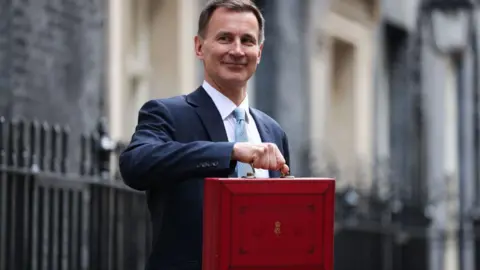
 Getty Images
Getty Images
The Treasury should have disclosed a £9.5bn overspend in the public finances in the run-up to the previous government's Budget "under the law", the head of the UK's official spending watchdog has said.
Richard Hughes, chair of the Office for Budget Responsibility (OBR), told a committee of MPs that the Treasury had questions to answer over why such information was "not provided to us".
His comments prompted the committee's chair, Meg Hillier, who is also a Labour MP, to suggest that the Treasury "may have broken the law".
The 9.5bn overspend formed the basis of Chancellor Rachel Reeves’ claim in her first Budget last week that the Conservatives left Labour with a £22bn "hole" in the public finances.
The Treasury and the Conservative Party have been contacted for comment.
Last week the OBR said the last government "did not provide" them with all available information at former chancellor Jeremy Hunt's last budget in March, prompting a further political row over the true state of the public finances Labour inherited in July.
Asked by the committee how a £9.5bn shortfall could have happened, the OBR's Mr Hughes said "the system very clearly broke down", but insisted "that kind of failure will not happen again" because of processes put in place since.
The OBR works closely with the Treasury. Its role is to assess the government's tax and spending plans and produce reports on whether the chancellors' plans are sound. Its judgements and forecasts are closely watched by financial markets to determine if the UK's economic plans are credible.
Pushed on whether the Treasury broke the law over not disclosing an overspend, Mr Hughes said there may "have been a misunderstanding of how the law ought to be interpreted".
"There is no doubt in our minds that had that information been provided we would have had a materially different judgement," he added.
He said it "was a question for the Treasury to ask: why was information available within the Treasury and not provided to us?"
In summarising Mr Hughes' comments, Hillier said: "The Treasury may have even broken the law in the run-up to the Spring Budget in not disclosing all the spending information."
Shadow chancellor Hunt has previously accused the OBR of failing to act in a "politically impartial manner" by releasing its findings about the overspend on the day of the Budget last week, arguing it would help make the case for Labour's big tax rises.
Hunt said it was "impossible to know" how much of the £9.5bn would have been compensated for by savings elsewhere.
'Workers hit more than employers by NI tax rise'
Separately, the OBR told the committee workers will take most of the hit from the upcoming increase to employers' National Insurance (NI) contributions.
At the Budget, Reeves said employers will pay NI at a rate of 15% on salaries above £5,000 from April, up from 13.8% on salaries above £9,100.
The OBR has calculated that three quarters of the impact would be felt by employees as bosses hold back on pay rises and hiring in the face of higher wage bills.
The watchdog's Prof David Miles said it was "very plausible" this would disproportionately affect lower-paid workers.
Prof Miles said the OBR estimated employers would only take around a quarter of the hit from the NI changes in terms of lower profits, and suggested that the rest would be felt by workers.
He said part of the reason for this was the reduction of the threshold for employers paying the tax.
However, he suggested that the personal impact for workers might see "a bit of an offset" with the increase to minimum wages announced in the Budget.
The OBR's comments come after much debate around Labour's manifesto claim that there would be no tax rises on "working people" following its first Budget in 14 years.
James Smith, research director at the Resolution Foundation think tank, argued that the NI changes were "definitely a tax on working people".
"Even if it doesn't show up in pay packets from day one, it will eventually feed through to lower wages," he said.
Chancellor Rachel Reeves has defended increasing taxes for employers in last week's Budget while saying she is "not immune" to the criticism she has received.
She told the BBC the money raised would help put public finances on a "firm footing".
The decision has come under fire from many businesses, including GPs who argue it could hit services for patients.

 Movie
Movie 1 month ago
25
1 month ago
25 





![Presidents Day Weekend Car Sales [2021 Edition] Presidents Day Weekend Car Sales [2021 Edition]](https://www.findthebestcarprice.com/wp-content/uploads/Presidents-Day-Weekend-car-sales.jpg)



 English (United States)
English (United States)